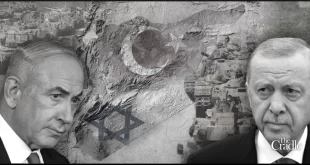by Steven Nezar Sahiounie, Syrian journalist. Wide-ranging interview with Max Parry on Russia, China, and the Middle East, republished from Mideast Discourse.

The US is faced with a long list of hot-spots and tensions. Beginning with the situation in Iraq, where the Parliament has asked the US troops to leave. However, the US has refused a withdrawal, and instead has announced the 2,500 soldiers will be kept on the ground, but in a support mission, not combat.
The tensions between the US and Russia are at the boiling point as Washington threatens, but President Putin replies, “We didn’t come to the US or UK borders, no, they came to ours,” he said recently.
Presidents of the US and China held a virtual meeting, but did not make headway in resolving lingering US-China trade war disputes. Trump started a trade war in 2018 which has resulted in both nations paying higher taxes to bring in goods from the opposing country.
The US and other western powers have been meeting with Iranian officials concerning renewal of the Iran nuclear deal cancelled by Trump. Iran says the removal of sanctions is a fundamental priority, and it is not clear if the US will accept those terms.
Steven Sahiounie of MidEastDiscourse interviewed Max Parry to gain some insight into these situations which are headlines in the international news.
Max Parry is an independent journalist and geopolitical analyst based in New York. His writing has appeared widely in alternative media, including the Center for Research on Globalization, the Unz Review, Dissident Voice, and the Greanville Post where he serves as an associate editor. He frequents appears as a political commentator for Sputnik News and Press TV.
1. Steven Sahiounie (SS): The US military is pulling out of Iraq. In your opinion, is the Iraqi military capable of preventing an ISIS resurgence?
Max Parry (MP): First of all, the timetable for the expected drawdown of coalition troops from Iraq is still up in the air. Until now apparently, the resolution passed by the Iraqi parliament following the Soleimani assassination was completely disregarded by Washington. Initially, the ostensible reason for the protracted reentry of foreign forces in the country was to combat Daesh (editor’s note ISIS) and that pretext for the US-led combat mission expired nearly four years ago, yet coalition forces still remain. Given the historical precedent set by American foreign policy, part of me tends to agree with the pessimistic fears that the announcement by senior US and Iraqi officials of the transition to an “advisory role” is likely just another cosmetic facelift for a continued U.S. occupation. While to some extent I am cynical that Washington has any real intention of withdrawing, the recent developments in Afghanistan arguably marked a turning point for waning US influence in the region so perhaps it is a real pullout of boots on the ground in Iraq after all. I would note that the resurgence of Daesh, which had been mostly eliminated at the hands of the Iraqi PMU in the areas under its control unlike the former caliphate territory under U.S. occupation, began shortly after the inauguration of Joe Biden earlier this year. It also seems like whenever there is any inkling the US is going to leave the country, an ISIS terrorist attack conveniently occurs (never against the US bases though curiously) and gives the perfect excuse for Washington to remain. Meanwhile, the U.S. frequently serves as the air force on behalf of the remnants of Daesh by targeting the PMU even as they are fighting ISIS across the border in Syria. At the end of the day, the U.S. uses Daesh as a strategic asset in the region to dominate countries like Iraq and the only hope for ISIS to be eliminated lies with the PMU, not al-Kadhimi and the Iraqi government which essentially allowed the U.S. to murder Soleimani and al-Muhandis on its territory and continuously provokes the Popular Mobilization Forces.
2. SS: The US/EU political pressure on Russia is increasing. In your opinion, how will Moscow react to this pressure?
MP: The source of the tensions between the US/EU and Moscow is the absence of a security guarantee rightfully demanded by the latter from the West, Ukraine and NATO which are leaving Russia with little choice but to take a hard line against their provocations. It is Washington which has continuously withdrawn from arms reduction treaties and NATO that has enlarged eastward despite informal pledges not to expand made to the Kremlin at the end of the Cold War. Russia has no choice but to interpret this encirclement and unfriendly course of action as hostile. I think we could see in Ukraine what we saw in Georgia back in 2008, one of the shortest conflicts in the history of warfare, where US and Israeli-backed Georgia provoked Russia by shelling civilians in Abkhazia and South Ossetia. I believe the same kind of war crimes could occur in Donbass with Ukraine provoking Russia by escalating the conflict in Donetsk and Luhansk. After all, the Russian troop buildup on its border was triggered by Ukrainian President Zelensky’s decree stating Kiev’s intentions to retake Crimea from Russia and Donbass from the Russian-speaking separatists. I do not believe NATO is suicidal enough to directly attack Russia but I do see a potential hot war brewing between Ukraine and Russia with the West using Kiev as a cat’s paw for imperialism against Moscow.
3. SS: The Biden administration is in an economic war with China. How will this economic tension reflect on the world economy?
MP: Fundamentally, if you take a close look at Biden’s Built Back Better initiative and legislation, on a geopolitical level it is basically a counter to China’s Belt and Road infrastructure project. For example, its framework weaponizes the issue of climate change as means to single out China and the New Silk Roads to be punished by economic warfare, namely in the form of sanctions. The U.S. geostrategy is clearly dead set on containing China’s infrastructure development and investment of the global south. Meanwhile, at the G7, the World Economic Forum, and these other Western financial institutions we’ve seen them adopt this “Build Back Better” slogan in coordinated unison for the so-called “Great Reset” or Fourth Industrial Revolution, as some call it, in the wake of the pandemic. We can see how the US-China trade war is playing out in the realm of big tech, with the success of TikTok and U.S. attempts to designate it a threat to national security. Not to mention, there were the sanctions on Huawei. This is because China is on pace to overtake the U.S. as the preeminent country in the world not just economically but geopolitically in the next ten years and this conflict is taking shape in every aspect of the world economy. The U.S. is desperate to halt the rise of Beijing in the global arena because while it has depleted trillions from the Treasury on endless wars and wasteful military spending, domestically it has been de-industrialized and outsourced virtually all of its manufacturing overseas since the 1970s. We are truly witnessing the emergence of a multipolar world and I believe these efforts by the U.S. to keep pace with China were not made soon enough to make any difference.
4. SS: Will the Zionist Lobby in the US be successful in preventing a new nuclear deal with Iran?
MP: I don’t believe the United States is committed to a return to the JCPOA under Biden. Iran has made it abundantly clear the U.S. must lift all sanctions imposed since 2018 after the Trump administration unilaterally withdrew from the agreement. Biden has been in office nearly a year and has had ample time to make good on his campaign pledge, the ball has been in his court. Instead, we’ve only seen Washington demand further concessions from Iran regarding ballistic missiles, for example, if the agreement is to be re-implemented. The Zionist lobby tried to sabotage the non-proliferation framework from being adopted and was instrumental in Trump’s move to kill the deal in total violation of international law. While AIPAC’s powerful influence over Washington obviously remains under the Democrats, Biden seems more concerned with using the abandonment of the JCPOA as a political football to score points against Trump and the GOP rather than follow through on returning to what was considered a foreign policy victory under Obama. I foresee a crisis coming to a head between the US and Israel which has become a pariah and total PR disaster for the U.S. where the tide of public opinion domestically is starting to turn against the Zionist entity. That said, I think we are still some ways away from any South Africa-like moment for the Palestinians, unfortunately.
5. SS: Is the Nord Stream 2 pipeline project operational? How is this affecting the relationship between Russia and the EU?
MP: Construction of the pipeline was completed but it is not yet operational, awaiting certification from Germany’s energy regulator. This has huge implications for EU-Russia relations and for the Ukraine crisis, as Ukraine is a transit country economically reliant on gas transit feeds the new pipeline would bypass. The US would also be impacted because its economic foothold in Europe would be reduced. In the midst of this, the EU and US are accusing Russia of using the pipeline and its supply of natural gas to Europe to its advantage. These factors are all behind what is driving the crisis in Ukraine and the NATO provocations in the Black Sea against Russia.
Steven Sahiounie is a two-time award-winning journalist
 Syria Support Movement solidarity with the Syrian people
Syria Support Movement solidarity with the Syrian people




